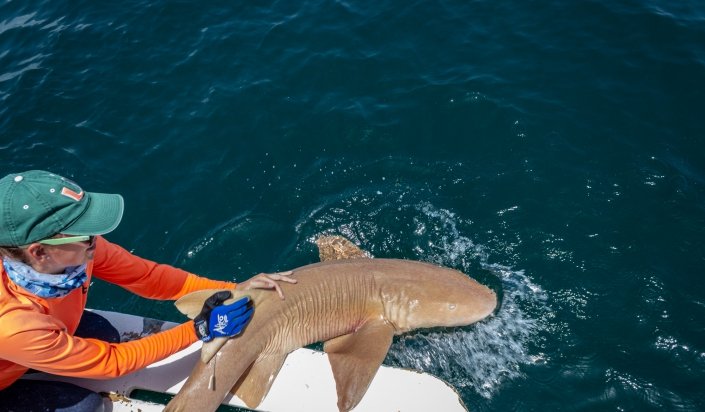
Zebra sharks, also known as Stegostoma fasciatum, are more than just another fish in the sea. They play an important role in their ecosystems, helping to maintain the health of coral reefs and sandy seabeds. Unfortunately, as our planet warms, these environments are changing dramatically, and the zebra shark is feeling the effects. In this article, we’ll dive deep into the various ways climate change is impacting these amazing creatures, from their habitat loss to their reproductive health.
The Basics of Zebra Sharks
Let’s start by getting to know our zebra shark friends a little better. These bottom-dwelling sharks, which can grow up to 11 feet long, are found in warm, shallow waters across the Indo-Pacific region. With their distinctive stripes, they resemble a zebra—hence the name! They’re not your typical predator; zebra sharks primarily feed on mollusks, crustaceans, and small fish, relying on their keen sense of smell.
Zebra sharks are often seen lounging on coral reefs or sandy patches during the day. They’re nocturnal hunters, actively searching for food at night. Interestingly, they have the remarkable ability to breathe while resting on the ocean floor, thanks to a specialized method of pumping water over their gills. If you’ve ever tried to snorkel in a shallow reef, you know it’s like navigating a world of wonder—just like the zebra sharks who call it home.
The Impact of Rising Ocean Temperatures
One of the most pressing issues facing zebra sharks today is the increase in ocean temperatures due to climate change. Think about how you feel when you’re too hot—uncomfortable and sluggish, right? Zebra sharks feel the same way when their environment heats up. Rising temperatures can lead to coral bleaching, which is when corals lose their vibrant colors and become unhealthy. Since zebra sharks depend on healthy coral reefs for shelter and food, this is a big deal.
Corals are like the cities of the ocean, and when they start to die off, everything else suffers. Without their natural habitat, zebra sharks face challenges in finding food and avoiding predators. Researchers have found that even a slight increase in water temperature can lead to stress in zebra sharks, affecting their growth and overall health. In essence, a warmer ocean creates a ripple effect that can disrupt the entire underwater ecosystem.
Ocean Acidification and Its Effects
Another impact of climate change is ocean acidification, which is a fancy way of saying that our oceans are becoming more acidic. This happens because the ocean absorbs a lot of carbon dioxide from the air, making it harder for marine life to survive, especially organisms like coral and shellfish. Since zebra sharks rely on these creatures for food, their survival is at risk.
Imagine trying to eat your favorite meal when the ingredients are hard to find and not as tasty as before. That’s what zebra sharks are experiencing. With fewer healthy mollusks and crustaceans available, their diet suffers, leading to potential starvation. Additionally, the stress from habitat changes can weaken their immunity, making them more susceptible to diseases. Ocean acidification is a silent threat that complicates many aspects of life for these gentle sharks.
Habitat Loss and Degradation
As climate change continues to reshape our world, habitat loss is a growing concern for zebra sharks. Coastal development, pollution, and rising sea levels are encroaching on their natural environments. Picture a beach slowly disappearing as the tide rises. That’s happening to the areas where zebra sharks thrive.
Many coastal regions are seeing their habitats altered due to human activities, such as construction and pollution. Marine ecosystems are delicate, and when they’re disturbed, it can take a long time for them to recover. Zebra sharks depend on seagrasses and coral reefs for food and shelter, and as these areas degrade, they have fewer safe places to live and hunt. This loss of habitat can lead to population declines, which could have serious consequences for the entire marine ecosystem.
Reproductive Challenges
Zebra sharks, like many other species, face reproductive challenges due to climate change. These sharks reach sexual maturity at around 5-6 years, but the stress from environmental changes can disrupt their breeding cycles. Here’s the thing—if female zebra sharks aren’t able to find the right conditions to reproduce, their populations could dwindle over time.
Warmer waters can also affect the viability of their eggs. Just as some plants need the right temperature and moisture to sprout, zebra shark eggs require specific conditions to develop successfully. If the water temperature is off, it could lead to fewer hatchlings making it to adulthood. This cycle of reproduction is crucial for their survival, and any disruption can have long-lasting impacts.
Conservation Efforts and Hope for the Future
Despite the many challenges zebra sharks face, there’s hope! Conservation efforts are underway to protect these incredible creatures and their habitats. Organizations and researchers are working together to create marine protected areas, which are regions where human activity is limited to allow ecosystems to recover. It’s like letting a flower garden bloom without interference.
Public awareness is also growing, and more people are becoming interested in supporting sustainable practices that protect marine life. By reducing plastic pollution, promoting responsible fishing, and advocating for climate action, individuals can help safeguard the future of zebra sharks. Every little effort counts when it comes to preserving our oceans and the unique species that call them home.
Climate change may seem like a distant problem, but it’s very real for zebra sharks and countless other marine species. Their lives are closely tied to healthy ocean environments, and as conditions change, they’re facing unprecedented challenges. Understanding these impacts is the first step toward making a difference.
We can all play a part in supporting conservation efforts and protecting the ocean. Whether it’s reducing our carbon footprints, participating in beach cleanups, or supporting sustainable seafood choices, our actions matter. As we navigate this complex issue, let’s remember the zebra shark and work together to ensure their survival for generations to come. After all, a healthy ocean is a vibrant ocean, and that benefits not just the zebra sharks but all of us.

